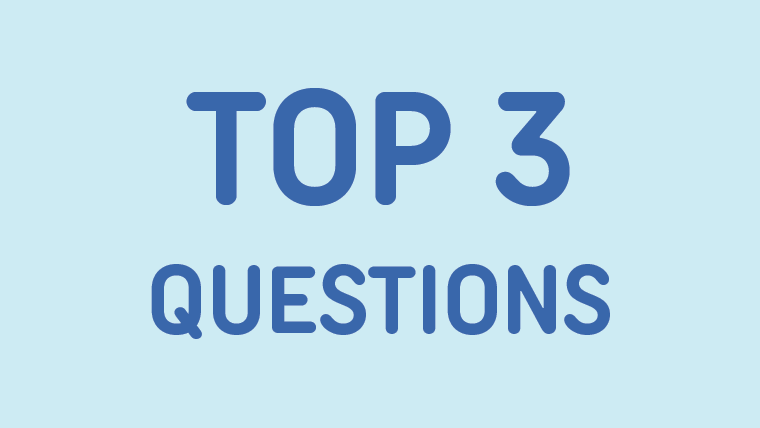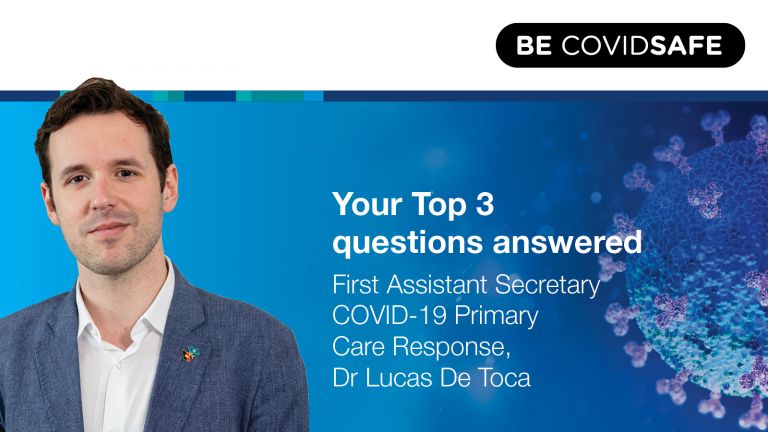
Good morning. I am Doctor Lucas de Toca and lead the rollout of the vaccine through general practice. Welcome to this segment in which we will be answering some of the most common questions that you have been asking through our social media channels. Today, as usual, I'm joined by Linda who is doing Auslan interpreting. We are on the land of the Ngunnawal people and today is Aboriginal and Torres Strait Islander Children's Day. Dhawra nhuna, dhawra Ngunawal. Yanggu gulanyin ngalawiri, dhunayi, Ngunawal dhawra. Wanggarralijinyin mariny balan bugarabang, and I also extend that acknowledgement to the owners of the lands of people where may be watching us from. My shout out today goes to all healthcare workers that are working around the clock in contact tracing and testing and swabbing and analysing the results across the entire country, as more and more people are coming forward to get tested. As you know, it is incredibly important that we get tested, either if we are invited to do so by public health authorities because we have been to an exposure site or when we have symptoms that are like cold and flu, no matter how mild. That is the only way where we can keep detecting new cases and get on top of the different outbreaks we have across the country.
The first question that we have today is about children and Covid and whether parents should be taking any additional or new precautions now that we are seeing more cases of COVID-19 among children.
So, when COVID-19 came into our lives more than 1.5 years ago, we were seeing that transmission could occur at any age, but the cases in children tended to be less frequent than in adults. We also know, and that continues to be true, that cases in older people have a much higher risk of severe disease, hospitalisation or death than in younger people, even though young people can still get serious outcomes from COVID-19. Some of the new variants like the Delta strain, that we are all now very familiar with, are much more transmissible than the original strain of the virus that started earlier last year or late 2019. That means that because the virus is more transmissible, we are seeing more infection across all ages, which means that we are seeing more kids contracting the infection. The Australian Government accepted the advice from the Australian Technical Advisory Group on Immunisation to open the vaccination program to children 12 to 15 years of age, or adolescents 12 to 15 years of age, in particular cases, for those with underlying medical conditions, for Aboriginal and Torres Strait Islander children 12 to 15, and for people 12 to 15 years of age in remote communities when they are doing a whole of community vaccination program. All other children 12 to 15 are yet not eligible for the vaccine and younger kids are yet to be eligible. We expect as more evidence emerges and the Therapeutic Goods Administration reviews the evidence available, we might expand the vaccine program to younger cohorts. In the meantime, it is really important that children, and their families, parents, everyone else continues to practice their COVIDSafe behaviours that are now ingrained into our minds after the last 18 months, so of course, maintain physical distancing and stay 1.5 m away from others, try to avoid gatherings and large crowds, stay at home, isolate and get a test if you have symptoms, no matter how mild, and continue to practice good hand hygiene including hand washing frequently and if you don't have soap and water, using hand sanitiser that is at least 60% alcohol. And, of course, for adults or older adolescents that are eligible for vaccination, get vaccinated so you can protect those who cannot be vaccinated such as younger kids.
Related to this is another question that we get is how does the COVID risk change for me if I have been fully vaccinated from COVID-19?
That is quite a relevant question as more and more people in Australia are now vaccinated, with over 40% of everyone 16 years and over having received at least one dose and in some jurisdictions close to over 90% of older people having received at least one dose. Having the vaccine with either Pfizer or AstraZeneca, both vaccines are incredibly effective, is the best way to protect yourself against severe disease, hospitalisation and death from COVID-19. It doesn't mean it will prevent everyone from getting infected with COVID-19. What we are seeing in countries where Covid is more prevalent, is if you have a lot of virus circulating, if you have a lot of infections occurring, it will happen that people who are vaccinated will contract the disease. However what we are seeing is that people who are vaccinated have a much lower rate or chance of being seriously sick from COVID-19. Even against the Delta strain, that we are also concerned about at the moment, we see that two doses with either the AstraZeneca or the Pfizer vaccine provide more than 90% protection against severe disease, hospitalisation and death, and we have that from real-life data from countries like the United Kingdom. It's also really encouraging that the vaccines, while not infallible at preventing infection, drastically reduce the risk of transmitting the disease to others. It doesn't eliminate it and that is why it is important that people who are vaccinated continue to adhere to the public health restrictions and COVIDSafe measures, but dramatically reduces it. We are seeing that household transmission in the UK is reduced in households that are vaccinated quite dramatically and really interesting stats, for instance, in the United States, we are seeing that 97% of people currently hospitalised for COVID-19 were unvaccinated even though there is less than one in three Americans that have not received a Covid vaccine, so the majority of the population is vaccinated and still almost all hospitalised cases are from people who have not received the vaccine. So essentially what we are seeing is these vaccines will be great at protecting you, they seem to have a quite significant effect at preventing infection and transmission but ultimately, what we need to have is as many people as possible vaccinated so they themselves are protected from contracting the disease.
This is related to our last question, which is about the recently released modelling from the Doherty Institute and the in principle agreement that National Cabinet reached last week about ascribing some targets to their four stage plan for reopening Australia or moving into some form of Covid normal.
The Department of Health yesterday published and the Covid vaccine task force released modelling from the Doherty Institute and economic modelling from the Department of Treasury that gives us some indication on what are the kind of targets and different thresholds that we can aspire as a nation in order to move forward. It sets a path by which Australia can transition from its current status, prevaccination status and when the population is receiving the vaccine, but still our main strategy is to suppress the virus, try to minimise community transmission to the maximum and trying to achieve no community transmission with harsh public health restrictions so the virus does not spread and gives a pathway for the transition in to a postvaccination status in which we need to live with the virus with a high proportion of the population vaccinating and try to control severe disease, hospitalisation and death from the virus, while moving forward to a more normal society with open borders etc. Two of the key thresholds, and none of these are absolute but they give an indication of some risks and trade-offs, but two of the key thresholds were that it is recognised that when 70% of the adult population is fully vaccinated, it means that we can vary dramatically minimise serious illness, hospitalisation and death and we will be able to reduce the number of restrictions and lockdowns will be less likely. With 80% of the population vaccinated, that even more significantly reduces or minimises hospitalisations, severe disease and death and also makes fewer public health restrictions necessary. When we achieve these targets and when we get a very significant proportion of the population fully vaccinated, then we can look into reopening our borders and normalising our situation in terms of travel and international flow, but this is reliant on having as many people as possible, as quickly as possible, vaccinated with two doses so we have that protection for everyone. In the meantime, if it is your turn to get a vaccine, go to health.gov.au, check the eligibility and go and book an appointment because that is the best thing we can do to protect ourselves and our loved ones.
That is all for today. Thank you and we will see you next time.
Top 3 questions:
- Should parents be taking extra precautions now children are more likely to get the Delta variant?
- I've been vaccinated, how does this change the risk of COVID-19 infection for me?
- Can you explain why we need 70%-80% of people to be vaccinated before we open our borders?







